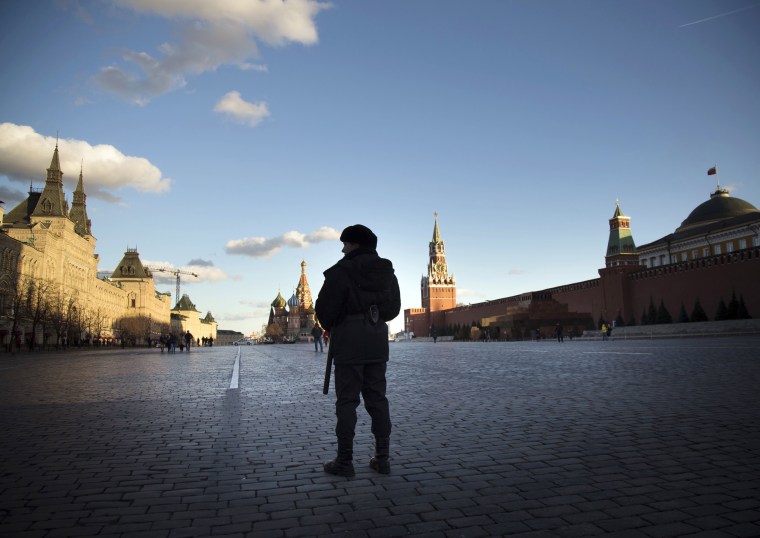The White House is accusing Russia of trying to “cover up” Syrian president Bashar al-Assad's role in a chemical weapons attack that left dozens, including children, dead and spurred U.S. military strikes.
Senior administration officials briefed reporters Tuesday on declassified intelligence that knocks down the Russian-pushed narrative that last week’s deadly chemical weapons attack could have been carried out by non-state or terrorist actors.
One administration official called that effort an absolute cover up of Syrian regime culpability, and reinforced the U.S. narrative that the Assad regime was behind the attack and that the gas used was, in fact, sarin.
Russians have a “clear pattern of deflecting blame” from the Assad regime, another administration official said.
White House officials, who briefed on condition of anonymity, called for Russia to use this as an opportunity to “stop the disinformation campaign” and instead commit to helping the international community eliminate chemical weapons stockpiles in Syria.
White House officials have questioned how much Russian forces knew about the planned attack since they are located at the same aircraft installation where the attacks are thought to have originated.
Secretary of Defense James Mattis said Tuesday that the goal of the U.S. missile attack on a Syrian airbase was to discourage any future use of chemical weapons.
"So the intent was to stop the cycle of violence into an area that even in World War II chemical weapons were not used on battlefields," he told reporters. "Even in the Korean War, they were not used on battlefields. Since World War I, there has been an international convention on this and to stand idly by when the convention is violated — that is what we had to take action on recently in our own vital interest."
Relations between the U.S. and Russia are “in their worst period since the end of the Cold War,” the Kremlin said Tuesday — just as America’s top diplomat arrived on a visit.
As Secretary of State Rex Tillerson traveled to Moscow for a meeting with his counterpart Sergei Lavrov, Russia’s foreign ministry spoke of "a long list of irritants created by Washington.”
Vladimir Putin went further, comparing America's accusations of a chemical attack in Syria to its justification of the Iraq invasion. "We saw this before," Russia's president told reporters. "It reminds me the events of 2003."
Tillerson's visit takes place against a backdrop of escalating tensions, and it remained unclear if Trump's top envoy would even meet Putin during the trip.
"It's clear that Russian-American relations are in their worst period since the end of the Cold War,” the foreign ministry said. “The previous U.S. administration has done all it could to exacerbate them."
It came after U.S. Navy Admiral Michelle Howard said the Mediterranean Sea has seen worrying spike in Russian naval activity to levels not seen since the Soviet Union.
The recent suspected chemical weapons attack by Syria and the swift U.S. military response of 59 Tomahawk missiles only exacerbated the tensions between Moscow and Washington. Moscow is one of main backers in the conflict.
Asked on Tuesday about the tough talk from leaders from both countries, U.S. Secretary of Defense James Mattis told reporters he is confident relations "will not spiral out of control."
"I'm confident the Russians will act in their own best interests, and there's nothing in their best interests to say they want this situation to go out of control," Mattis said.
"I hope that ... the Russian government concludes they have aligned themselves with an unreliable partner in Bashar al-Assad."
The foreign ministry statement said Russia hoped to learn Trump’s strategy on a number of foreign policy problems.
"We expect to hear about what the U.S. plans on doing in Libya, which has ended up de-facto split, same as Iraq, due to a NATO military intervention,” it said.
“What is the strategy for Yemen, where American weapons are used for massive city bombardments, which cause civilian deaths and exacerbates a humanitarian catastrophe?" the statement added, referring to the conflict in Yemen where U.S. allies in the Gulf are bombing a desperately poor population.
It said Russia was “very concerned” about Trump’s recent suggestion that if necessary America would act alone to contain North Korea, which has ratcheted up both its bellicose rhetoric and weapons testing.
"As for the bilateral agenda, the long list of irritants created by Washington is not decreasing,” it said.
Before leaving the G-7 summit in Italy for Moscow, Tillerson did clarify some of the Trump administration's thinking on Syria — signaling that America does not see a political future for Assad in Syria.
"I think it is clear to all of us that the reign of the Assad family is coming to an end, but the question of how that ends and the transition itself could be very important, in our view, to the durability ... of a unified Syria," Tillerson said.
"I hope that ... the Russian government concludes they have aligned themselves with an unreliable partner in Bashar al-Assad."
In his separate comments, Putin also claimed that Russia had information that chemical weapons would be planted in Syria in order to discredit Assad's regime. He repeated his call for an independent U.N. investigation into last week's suspect gas attack, near Idlib.



